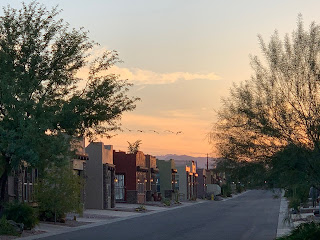NO, the bird does not kill deer. These birds are common in
the Sonoran Desert of Arizona and almost
everywhere in North America. It is the largest of the ringed plovers,
and the only plover in its range with a double breast band.
And, I just happened
to see one yesterday during my early morning walk.

Killdeer spend their time walking along the ground
or running ahead a few steps, stopping, bobbing their
head by extending their neck and then running again, etc.
A most interesting characteristic that is easy to identify
and fun to watch.
They are easy to identify because of their distinct markings.
They are brownish-tan on top and white below.
The white chest is barred with two black bands, and the brown face is
marked with black and white patches.
The bright orange-buff rump is conspicuous as they
get ready to take of...
Killdeer like open ground with low vegetation (or no vegetation at all),
including lawns, golf courses, driveways, parking lots,
pastures, fields, sandbars and mudflats.
This species is one of the least "water-associated" of all shorebirds.
I took the first photo which spiked my curiosity. Additional
photos along with many fascinating facts
were provided by the Audubon Society and Wikipedia.
Before the sun was up morning I heard a tremendous flapping noise
and thought it was coming from my iPhone via my ear buds.
By the time I got my act together and switched to "photo", the 2 bands
of sandhill cranes we almost out of site, as they headed to the
southeast corner of AZ where they will winter at the
Whitewater Draw Wildlife area near McNeal... and we plan
to be there soon to admire them in person.

In Nov 2013 we visited Bosque del Apache Nat'l Wildlife
Refuge, just south of Socorro NM, to see thousands of
these large birds, with a wingspan of up to 6 feet, all in one location.
And the subject of one of my photos became the
subject matter for the first stained glass window I ever made.
See how one thing leads to another!!! Stay tuned.,,










No comments:
Post a Comment